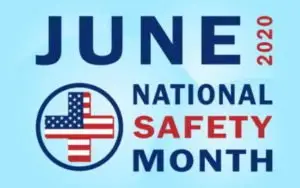
Let us start with a simple fact. As noted in the title, this being June, we are now in National Safety Month. 1 And how apropos to focus on that occasion, since the Coronavirus/COVID-19 pandemic and the traditional Atlantic hurricane season are both upon us. No – there will not be a footnote containing a litany of prior blog articles.
Safety consciousness in all elements of life, in an ‘always on’ mode, has been a central focus of this series since its onset. 2 In many if not most pieces there is at a minimum a passing mention of proactive risk management. With National Safety Month in mind let us, then, hone-in here on just that topic.
Let us start with a definition. “Risk.” Risk is “a prediction concerning potential loss based on known and unknown factors.” 3 This concept appears simple enough in its wording, but in terms of causation, sequencing, and decision-making it is actually more complex than it seems. Summarizing the definition, though, we can conclude the following about risk in all parts of life:
* It is full of contingencies; and
* It relates to the context within which the fact-sets exist: for example, the place, time, mix of personalities involved, and current legal/regulatory environment.
Why should individuals, families, and business entrepreneurs and operations managers care about risk?
* Because life in all its richness is full of surprises; and
* Simply put, it is less expensive (time, treasure, talent) to attempt to understand in advance what can occur in all its possible permutations, and then to respond accordingly.
In general terms how does one manage risk in the world? Reduced to the essence, one does that by:
* Learning from experience;
* Going through the learning curve; and
* Planning for the worst, and hoping for the best.
Now, risk as a concept has a bad reputation. But managing risk actually entails an optimistic outlook because it is always forward-looking and anticipates a future worth looking toward and experiencing.
Turning attention to business activities specifically, what is the outcome to business as a result of engaging in risk management? By regularly addressing the environment within which a business operates, and making preparations to act within that environment routine and second-nature, the business can focus its energy and creativity on innovating and bringing those innovations to market. In that light, risk management is the establishment of plans to protect one’s personal and financial interests in light of known and unknown risks, and is relevant to the creation of goods, the delivery of services, or merged into hybrids of both.
Developing risk management plans does not require one to “invent the wheel”. Rather, one can observe, absorb, and adapt best practices of others in the same field of endeavor, similar fields, or otherwise out in the world. 4 By establishing risk management plans, and doing so carefully, realistically, and proactively (‘ahead of the curve’”), a business can and should end up with the optimistic goal of operating within an innovation environment.
While there is a great amount of underlying details, simply put there are six sequential steps to engage in proactive risk management planning. 5
They are:
1 Assessing the facts presented from the learning curve.
2 Planning with respect to those facts.
3 Implementing the risk management plan.
4 Evaluating the effectiveness of the risk management plan in-action.
5 Auditing the outputs and outcomes of the risk management plan,
6 Documenting and reporting the outputs and outcomes of the risk management plan as-required (typically for businesses.)
Risk management planning as described above seems simple enough. But is indeed quite complex. This writer has actually applied it ‘out there’, and is available to assist companies and other organizations with creating and implementing these plans.
For information about Bogin, Munns & Munns business services.
For information about Bogin, Munns & Munns’ response to Coronavirus readiness.
=====================
Note: Citations are given to the sources to respect the original authors’ copyrights.
1 See June is National Safety Month and National Safety Month.
2 Here are three: September is National Preparedness Month, September is National Preparedness Month, and Contracts Should Be Built Around Risk Management Concepts.
3 Fundamentals of Business Law – Summarized Cases, Ninth Edition, Miller, South-Western Cengage Learning.
4 While observing the intellectual property of others.
5 The materials in this article are derived from a career of research, analysis, and real-world observations. And it is all protected by the writer’s copyright.
– For more information, call Philip N. Kabler of the Gainesville, FL office of Bogin, Munns & Munns at 352.332.7688, where he practices in the areas of business, banking, real estate, and equine law. He has taught business and real estate law courses at the University of Florida Warrington College of Business Administration and Levin College of Law and is the President-Elect of the Eighth Judicial Circuit Bar Association.
NOTICE: The article above is not intended to serve as legal advice, and you should not rely on it as such. It is offered only as general information. You should consult with a duly licensed attorney regarding your Florida legal matter, as every situation is unique. Please know that merely reading this article, subscribing to this blog, or otherwise contacting Bogin, Munns & Munns does not establish an attorney-client relationship with our firm. Should you seek legal representation from Bogin, Munns & Munns, any such representation must first be agreed to by the firm and confirmed in a written agreement.




